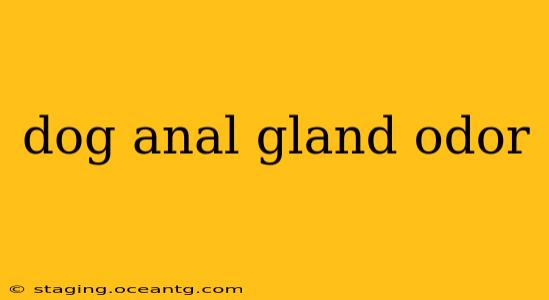The pungent smell of a dog's anal glands is not something pet owners often discuss openly, yet it's a surprisingly common issue. That characteristically foul odor, often described as a mix of fish and feces, can signal a problem requiring veterinary attention. This comprehensive guide delves into the causes, prevention, and treatment of dog anal gland odor, equipping you with the knowledge to address this sensitive topic effectively.
What Causes Dog Anal Gland Odor?
Anal glands, also known as anal sacs, are small sacs located on either side of the anus in dogs. They secrete a musky fluid that plays a role in marking territory and individual identification. Normally, this fluid is released naturally during bowel movements. However, various factors can disrupt this process, leading to an unpleasant odor.
- Infrequent Bowel Movements: Constipated dogs are more prone to anal gland problems because the pressure from hardened feces doesn't effectively express the glands.
- Loose Stools: Conversely, excessively soft stools may also not provide enough pressure for proper gland emptying.
- Low-Fiber Diet: A diet lacking sufficient fiber can contribute to constipation, indirectly affecting anal gland function.
- Obesity: Overweight dogs often struggle with proper bowel movements, leading to impacted anal glands.
- Anal Gland Infection: Bacteria or other pathogens can infect the anal glands, causing inflammation, pain, swelling, and a significantly worse odor. This often necessitates veterinary intervention.
- Anal Gland Abscess: A severe infection can lead to an abscess—a collection of pus—requiring immediate veterinary care. This is a painful condition and can lead to rupture and further complications.
- Allergies: Some dogs with allergies may experience anal gland issues as a secondary symptom.
- Breed Predisposition: Certain breeds, such as Cocker Spaniels and Poodles, are more susceptible to anal gland problems.
Why Does My Dog's Anal Glands Smell So Bad?
This question often stems from an already impacted or infected anal gland. The trapped fluid begins to ferment, resulting in a much more intense and unpleasant smell than the normal anal gland secretion. The odor intensifies with infection, becoming sharp, acrid, and distinctly unpleasant.
How Do I Know if My Dog Has a Problem with Their Anal Glands?
Beyond the obvious foul odor, several signs can indicate anal gland issues:
- Scooting: Your dog may repeatedly drag their rear end across the floor.
- Licking or Biting the Anal Area: Excessive licking or chewing of the anal region suggests discomfort or irritation.
- Swelling near the Anus: Visible swelling or redness around the anus indicates potential inflammation or infection.
- Pain or Discomfort During Bowel Movements: Straining or yelping during defecation suggests anal gland problems.
- Discharge from the Anal Glands: Noticeable discharge, often foul-smelling and pus-like, points towards infection.
How Can I Prevent Dog Anal Gland Problems?
Prevention is key to avoiding the unpleasantness of anal gland issues. Here are some proactive steps:
- High-Fiber Diet: Ensure your dog receives a diet rich in fiber to promote regular and healthy bowel movements. Consult your veterinarian for recommendations.
- Regular Exercise: Adequate exercise encourages regular bowel movements and helps maintain a healthy weight.
- Maintain a Healthy Weight: Obesity significantly increases the risk of anal gland issues; work with your veterinarian to achieve and maintain a healthy weight for your dog.
- Grooming: Regular grooming can help identify early signs of anal gland problems.
- Veterinary Checkups: Schedule regular checkups with your veterinarian to detect and address any issues early.
What Should I Do if My Dog Has Anal Gland Problems?
If you suspect your dog is suffering from anal gland issues, immediately consult your veterinarian. They can properly diagnose the problem and recommend the appropriate treatment, which might include:
- Manual Expression: The veterinarian may manually express the anal glands, releasing the accumulated fluid. This should only be done by a professional to avoid injury or infection.
- Medication: Antibiotics or other medications may be prescribed to treat infections.
- Surgery: In severe cases, surgery may be necessary to drain an abscess or address other complications.
By understanding the causes, prevention strategies, and treatment options for dog anal gland odor, you can proactively ensure your canine companion's health and well-being. Remember, a quick visit to the vet is always the best course of action when dealing with any concerning symptoms.
